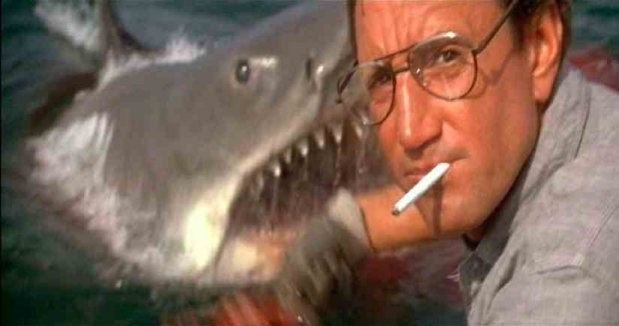Jaws was 40 years ago — why do humans still seek revenge for shark attacks?
Unless perception changes, some of the planet's most charismatic species could be wiped out in our lifetime.

Shut your eyes and take two deep breaths. The second breath you just took comes from the sea. Earth's oceans produce 50% of the planet's oxygen and they absorb around 40% of the world's man-made CO2. Without healthy oceans the planet can't survive. And healthy oceans can't survive without sharks.
So I find it inexplicable that nobody is taking any notice of that fact that around 73 million sharks are slaughtered every year. I find it shocking that the media persistently portrays sharks as menacing, mindless killing machines. And I am giddy with disbelief that a Hollywood film first shown in 1975 still holds a generation in its grasp.
Just to be clear, Jaws wasn't a documentary.
George Burgess, program director for shark research at Florida Museum of Natural History, has spoken about how "there was a collective testosterone rush that went though the US in the years following Jaws, where guys just wanted to catch these sharks so they could have their pictures taken with their foot on the head of a maneater and the jaws later displayed on their mantle".
Without a massive turnaround in the public's perception of sharks, this prevailing lack of sympathy for the ocean's pure hunting spirit could see some of the planet's most charismatic species — hammerheads, oceanic whitetips, threshers and tigers — wiped out in our lifetime. With other species set to follow.
Yet, at the same time, it strikes me that this endemic couldn't-care-less attitude has become the perfect backdrop for 125 countries in the world to relentlessly hunt for sharks, contributing to a global trade in shark products valued at a massive US$1bn (£748m) per annum, without any scrutiny. And sadly it would seem that this widespread better-them-than-me mentality is quietly endorsing an underwater genocide.
Of course no one wants to be killed by a shark, but the fear is genuinely misplaced. You're more likely to be killed by a toaster than you are by a shark. Dogs, cows and bees kill more people than sharks. More people died last year taking selfies then from shark attacks. For added perspective, Jack Bauer from the hit TV series 24 has killed more people than all recorded shark attacks from the past 540 years combined.
So it's really quite laughable to see the 1975 film play out in real life every time there is a human fatality to a shark attack. Just look at the knee-jerk response in Western Australia and Reunion Island to recent shark attacks. Considering that scientists say that shark culls do not lessen the risk of a shark attack, the decision to cull sharks can only be regarded as revengeful or, at best, a PR exercise fueled by the tourism dollar.
The news of a proposed cull in Perth, Australia, prompted the comedian and actor, Ricky Gervais, to tweet:
You can kill any shark that gets out of the sea and starts killing us in our natural habitat of streets and pubs and internet cafes. Deal?
— Ricky Gervais (@rickygervais) 27 January 2014
In my mind sharks deserve the same reverence as lions, tigers, elephants and rhinos. But it would seem that sharks don't have it going on the same way as their land-based counterparts.
After all a US dentist shoots a lion and the world's (social) media smells blood. So where's the outcry when Budweiser or Under Armour — sponsors of this year's Wimbledon winner Andy Murray — fund shark-fishing tournaments across the US?
But that really is a sideshow compared to the catastrophic depletion of global shark populations as industrial fishing fleets hunt millions of sharks solely for their fins to make shark fin soup.

To understand the problem you need to appreciate that fins are to sharks what tusks are to elephants. Shark fins are widely regarded as the most valuable fish products in the world. However, since the rest of the shark is considerably less valuable than the fins, millions of sharks die unrecorded as a result of a barbaric and wasteful practice known as finning, where fishermen slice the dorsal, pectoral and tail fins from the sharks and throw the carcass overboard to die.
So I find it inexcusable that an appetite for shark fin soup — once a dish purely for Chinese emperors — could just wipe out a creature that was patrolling our oceans since before dinosaurs walked the earth; a predator so perfect that it hasn't evolved for millions of years, and a fish so important that your life depends on it.
Given that today is Shark Awareness Day, I invite you to take two more deep breaths and then consider what you could do to help change the fortune of sharks around the world and, in turn, help save the planet.
Graham Buckingham is campaign director at Bite-Back Shark and Marine Conservation
© Copyright IBTimes 2025. All rights reserved.






















